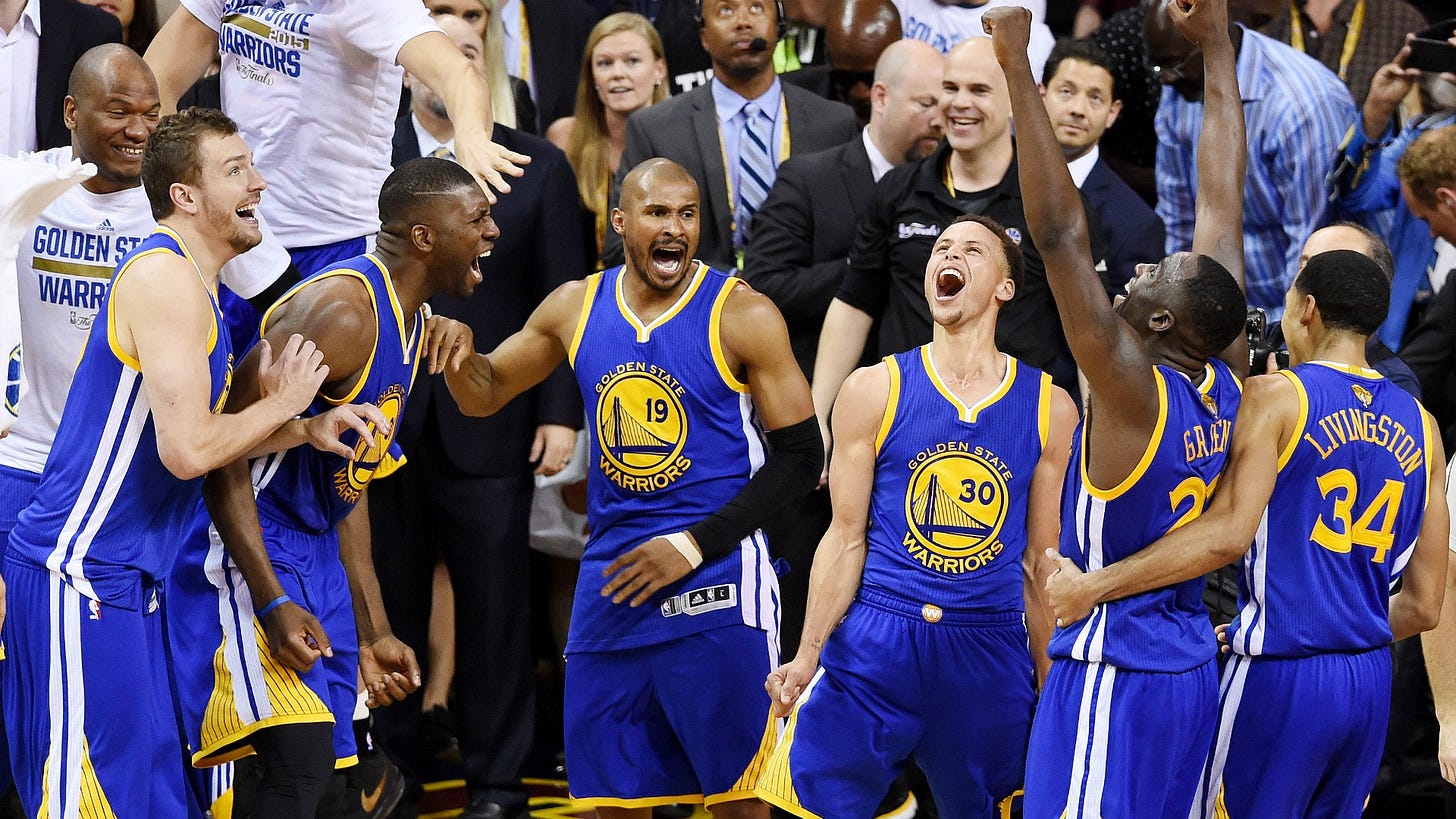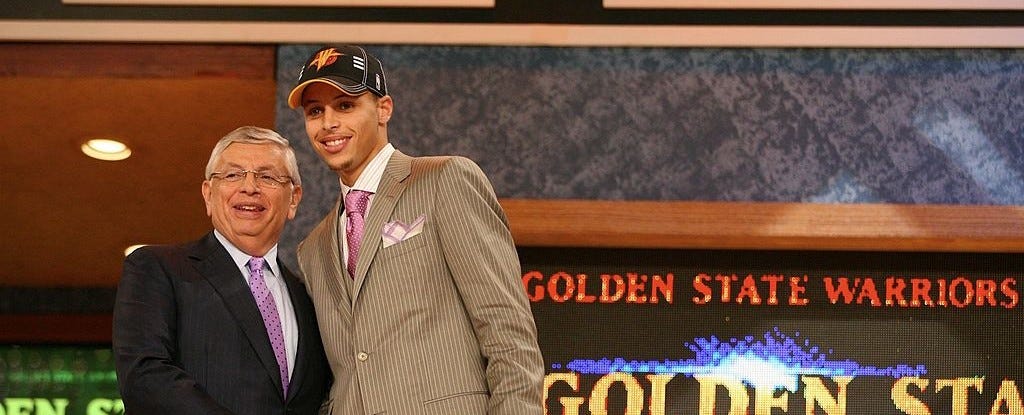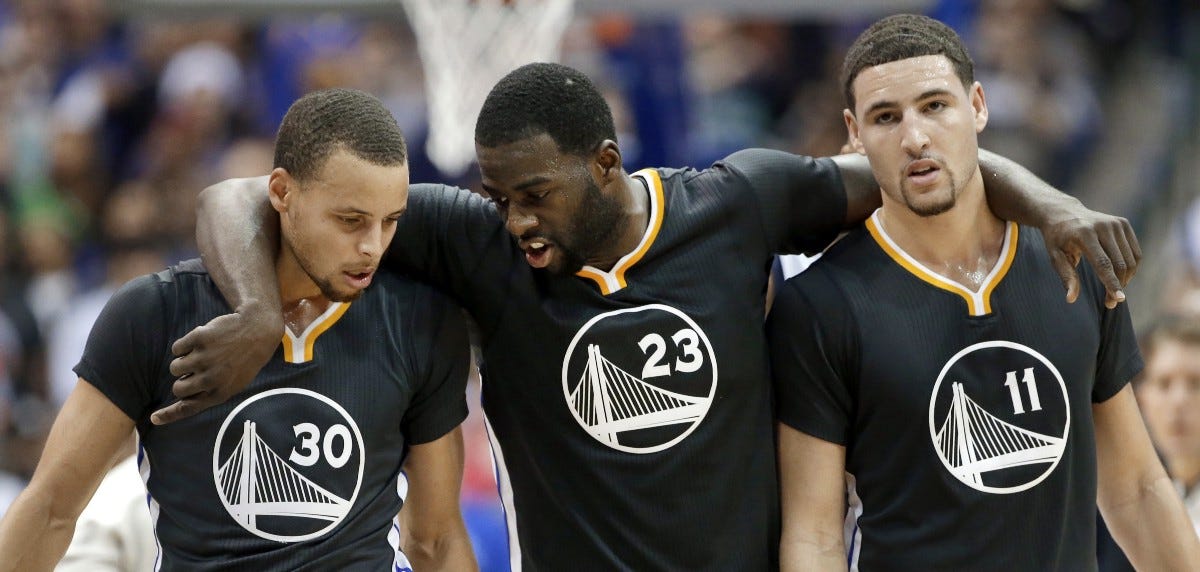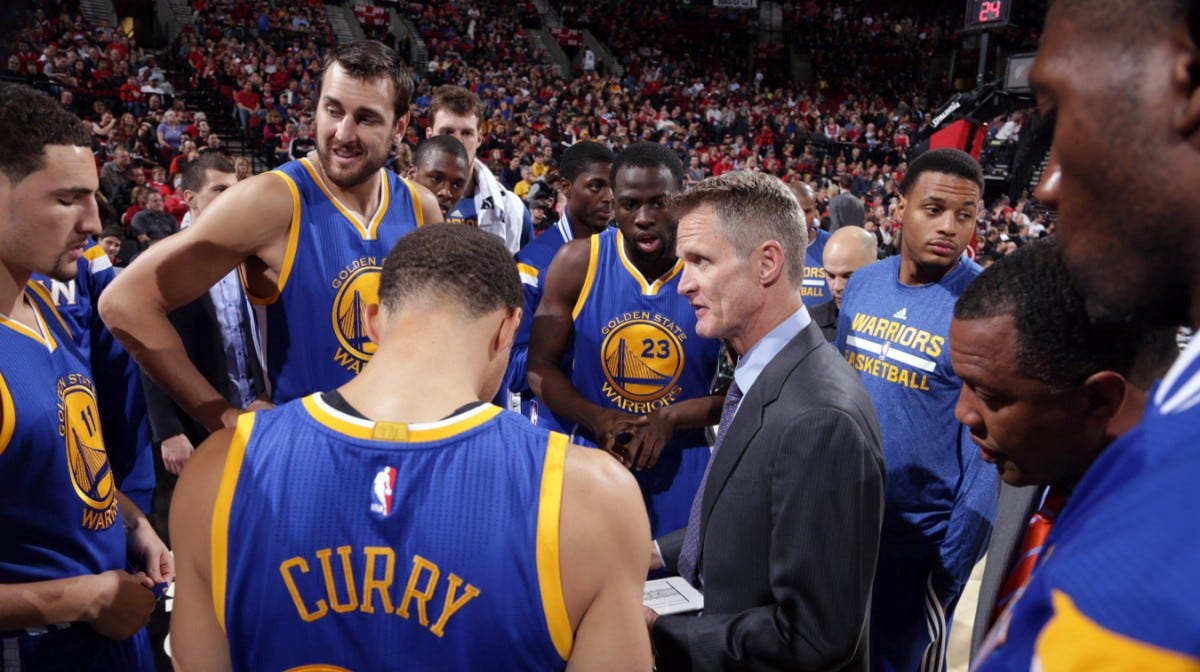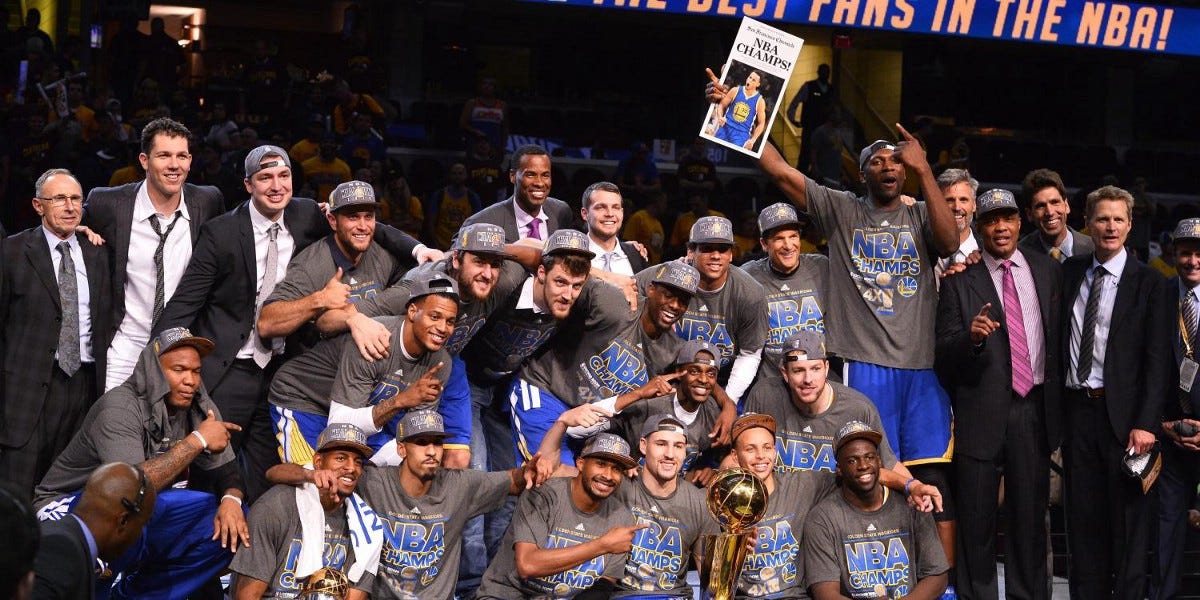What Startups Can Learn from The Warriors
73–9. A historic season that shattered record after record. Best start to a season. Most road wins in a season. Longest home winning streak…
73–9. A historic season that shattered record after record. Best start to a season. Most road wins in a season. Longest home winning streak at home between seasons. Most wins without back-to-back losses and never losing to the same opponent twice. And the list goes on and on. The Golden State Warriors had a season that will likely never be matched again statistically. A lot of that credit goes to their superstar point guard Stephen Curry, but even he will be the first to admit that he didn’t do it alone. The entire organization, from GM Bob Myers to the owners Joe Lacob and Peter Guber to the coaching staff led by Steve Kerr to players all the way down the bench including James McAdoo to Ian Clark, everyone contributed to making history. A lot can be learned from how the Warriors were able to pull it all off. Getting the right people in the right positions and roles. Building a culture of trust and “next man up” mentality. Creating a winning playbook that is effective and reliable. Never rest on your laurels and stay hungry at all times, the best is yet to come. All of these lessons are valuable to the success of any company.
Draft and Recruit the Right Players
Four out of five players in the Warriors starting lineup were drafted. The front office had the foresight to start building a team by identifying talent that was unproven in the NBA. Starting with drafting a small point guard from Davidson College in 2009 with their first round draft pick named Stephen Curry who was most famous for being the son of NBA veteran Dell Curry. In 2011, they drafted Klay Thompson in the first round from Washington State who was most famous for being the son of NBA veteran Mychal Thompson. In 2012 the Warriors hit the jackpot and drafted Harrison Barnes from UNC in the first round and Draymond Green from MSU in the second round (and picked up Festus Ezeli their backup center in the same draft). Four out of five starters on their championship team were identified and researched by scouts who did their homework and drafted by management who had a vision and saw potential. In a startup, it’s important to be able to identify people who have the potential to grow into a role as well. You make a bet at a much lower cost to your burn if you can find the diamonds in the rough. More often than not, draft picks end up not panning out. The same happens with employees at startups. There isn’t a culture fit, the role was not what they expected, they feel overworked. The best hires are often the ones that you roll the dice on. Do your homework: make sure the interview process is strong and relevant to the job responsibilities. If they pass your test from an attitude and aptitude perspective, then you may have a found a good fit. It doesn’t always work out, but when it does, it’s awesome and pays off in many ways.
A lesson can also be learned from recruiting all-stars and veterans. When the Warriors landed Andre Iguodala in 2013, he was bound for other teams who could pay him more, but he ended up in Oakland for less money because he wanted to be here. There’s a lot to be said about making your organization a desirable place to be a part of. Some companies do it with perks, some with compensation and some with mission. When you’re recruiting new members for your team, you have to sell them something compelling. Anyone experienced who is worth hiring is highly sought after and likely already in a position they’re happy at. Recruiting all-stars is a long game and takes time. Reach out to all-stars and grab coffee, even if they aren’t looking. Plant seeds and water them over time by keeping them up to date on your progress. The more you maintain their interest and intrigue, the more likely you are to land them down the road when the opportunity arises and they are unhappy with their current lot. If you play your cards right, you can land yourself an Andre Iguodala.
And finally, look for multi-dimensional players. The Warriors have ushered in a new era in the NBA. In the past, players played a specific role. Usually that role was one-dimensional based on position. Big men would block and rebound. Point guards would pass and shoot outside shots. The Warriors have designed a roster around multi-dimensional players who can do it all. With centers who can distribute the ball like Andrew Bogut and big men who can shoot the three like Draymond Green, Harrison Barnes and Marreese Speights and guards like Shaun Livingston who can post up and Steph Curry and Klay Thompson who can attack the rim, the opposing team has a difficult time knowing what to defend for. Similarly, as a startup your team should be multi-dimensional and every member should be able to contribute across disciplines. A marketing person should understand the product and operations as much as a data scientist should understand how the product is sold. This cross-functional knowledge makes everyone a better and more respected teammate. If you have a bunch of smart people in a room, good ideas can come from anyone, but even more so if they are tuned in to all parts of the organization.
Build a Culture of Trust
When you watch the Warriors play basketball it’s a thing of beauty. The ball movement, the unselfish screens and extra passes are all a reflection of trust. You trust your teammates to execute and do the right thing. On “teams” like the Rockets and Knicks, opposing defenses are fully aware where the ball is going. Those teams rely on the blackholes of their superstars James Harden and Carmelo Anthony to take the majority of the shots. It’s easy to predict and plan for those teams, but when you don’t know who is going to take the shot it becomes much more difficult. Any one of the Warriors could pull the trigger so it spreads opposing defenses thin covering the perimeter and the paint which allows for plenty of opportunities. Rather than relying completely on their superstar Steph Curry to carry the team, any of the Warriors feel like they can help win the game. Reserves Marreese Speights and Shaun Livingston proved that multiple times this season when the starters were having bad nights. The team plays selflessly to get everyone involved which empowers every individual on the team.
The Warriors trust creates a “next man up” mentality. When a teammate gets injured, it means someone else needs to step up. During the first round of the 2016 NBA Playoffs, Stephen Curry sprained his ankle and then sprained his MCL. The team proceeded to humiliate the Rockets by 30 points in the next two games without him. If your team trusts one another, you have a “next man up” mentality that everyone can contribute all of the time. People don’t feel like they have to sit on the sidelines or watch someone else take the ball and run with it. Every person in your organization can feel empowered to “take the shot” and lead a project or close a sale. When that trust isn’t there, it creates an environment of second-guessing and micromanaging which sucks time and energy from everyone. A big part of that is having the right players on the team who are capable and deserving of others trust and confidence.
Create a Winning Playbook
Steve Kerr is a winner. He played on the previous NBA regular season record holder 95–96 Bulls and he coached the record-breaking Warriors season after winning the NBA Championship. He was out for the first half of the season with complications from a back surgery over the summer. The Warriors went 24–0 to start the season without him. Luke Walton deserves some of the credit for that start, but Steve Kerr deserves credit for putting together the winning playbook. Fans are very familiar with plays like “Elevator Doors” when a defender gets trapped behind a double screen and the player gets freed up for an outside shot. The Warriors Weave is a simple combination of alternating passes at the top of the arc that ends in a pick-and-roll that allows a player to get free for a shot or drive by discombobulating the opposing defenders with confusing switches. It’s truly a thing of beauty to watch as a basketball fan. It’s the main reason people around the world love watching the Warriors play basketball.
By having an effective and reliable playbook that the team executes flawlessly time and time again, you can win a lot of games. The playbook reinforces the “next man up” mentality because as long as the plays are executed properly, it shouldn’t matter who is running them, the starters or the reserves. Nailing down your playbook is critical to the success of any startup. Once you figure out how to gain users and monetize them through a conversion funnel for more money than you paid to acquire them with tweaks and optimizations along the way, you have a playbook. You can push the pedal on the gas and reinvest in acquiring new users and generating more revenue. The same goes for a marketplace model. If you are able to build supply and demand while making the unit economics work, you can begin to replicate that model by planting flags in new markets with new teams. If the playbook works, with a few tweaks for each market, a competent new team should be able to execute the playbook to success.
Play for the Dynasty
After winning the NBA Championship last year, Golden State could have been content with a tremendous season. Rarely does a team follow a season that good with an even better season. The Warriors seemed laser focused right out of the starting block this season. It didn’t hurt that league MVP Steph Curry played out of his mind. The Warriors stayed hungry and wanted to top last season’s performance. How do you top a 67–15 championship season? By going 73–9 and shattering numerous records along the way to hopefully winning another championship. The Warriors stayed hungry.
Your company should always continue to strive to reach the next level. It shouldn’t be about raising money and a Series A or Series B round of funding. The next level should be another landmark of company’s success. 1 million users. 10 million users. 100 million users. Owning New York. Owning San Francisco. Owning London. Breakeven. $1M in profit. $10M in profit. Never be satisfied. Celebrate your wins, but know that someone else is always right behind you and keep pressing on. The cliche that it’s a marathon not a sprint is overused for a reason. If you continue to focus on the next mile marker, you will reap the accolades and rewards along the way, but it doesn’t mean you’ve finished the race. Many teams have won a single championship, only a handful have won multiple championships. You could win an NBA championship or you could start a dynasty. Go and build your dynasty.
If you enjoyed this post, please check out some of my other Medium articles:
Your Network Determines Success More than You Realize
People think luck, talent and hard work determines success. I would add that your network can drastically improve your…medium.com
The Most Important Skill of a Founder: Sales
After starting two companies, I’ve learned that sales is by far the most important skill a founder should have. And…hackernoon.com
Transform Your Complaints into Dollars
A common excuse I hear from people who say they want to start a company is that they don’t have any good ideas. I call…medium.com
Routine is the Enemy of Time
“Routine is the enemy of time. It makes it fly by. When you’re a kid everything is astonishing, everything is new.”medium.com
Take a Leap of Faith
Over the years, I’ve spoken on several panels and I’ve given many pep talks to friends and acquaintances who were…medium.com
What Startup Founders Could Learn from Restaurateurs
I’ve always felt a kinship with restaurant owners. It’s hard not to respect people who pour their blood, sweat and…medium.com



